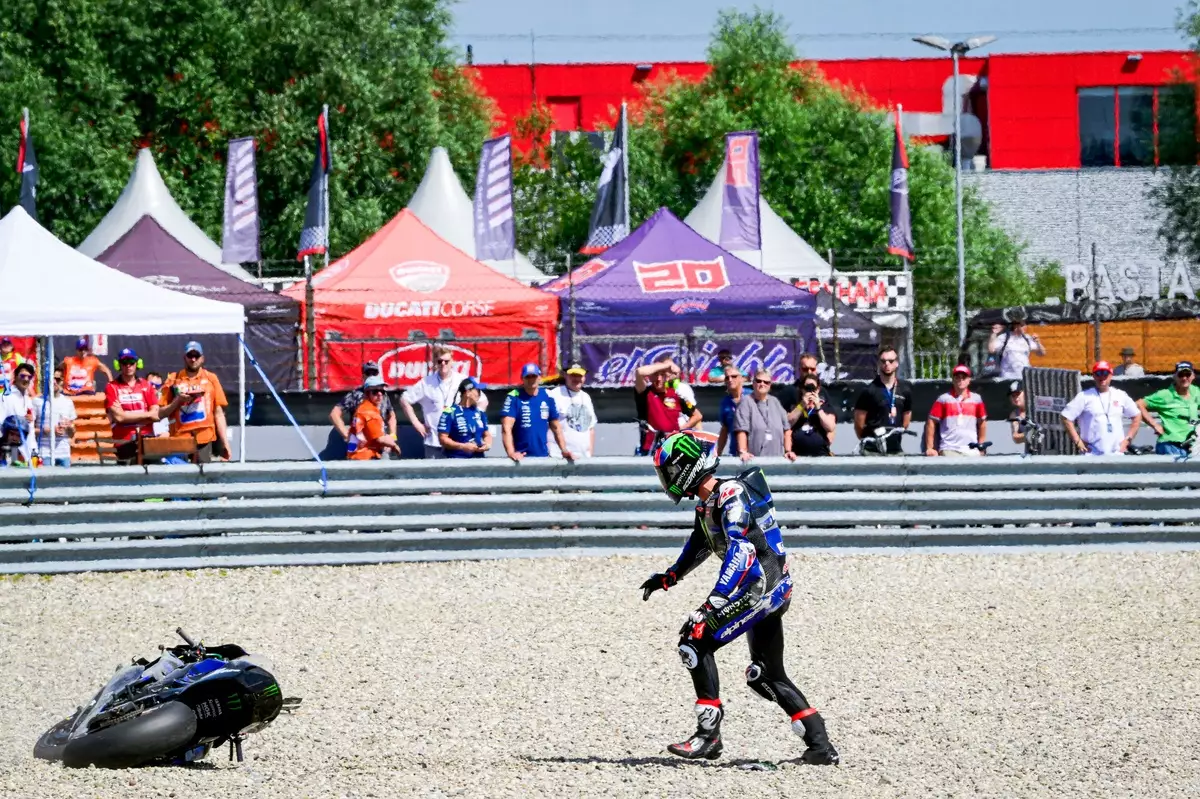The Intriguing Case of Alex Rins: A Façade of Confidence Amidst the Shadows of Doubt
In the high-octane world of motorsport, few stories are as captivating as that of Alex Rins. His journey is a blend of triumph and adversity that keeps fans on the edge of their seats. After a devastating accident at Mugello, questions about his performance have become more prominent, contrasting sharply with Yamaha’s continued faith in him. They extended his contract through 2026, even as he was still recovering. This situation raises important questions about Yamaha’s confidence in Rins and what this means for both him and the team moving forward.
Looking back at Rins’ career, he has had significant accomplishments before his injuries. Over an impressive eight-year span in MotoGP, Rins has consistently demonstrated his skill with six wins and 18 podium finishes. His victory at the 2023 Americas GP was a testament to his undeniable talent, even amidst challenges. But this success was quickly overshadowed by a severe accident that left him with major injuries to his left leg. His journey reflects the unpredictable nature of motorsports where highs can be swiftly followed by lows.
Injuries in motorsports can often be career-altering. For Rins, the severity of his Mugello accident came at a crucial time when contract negotiations were at their peak. Despite his excellent performance, the uncertainty from his injury history made teams cautious. Therefore, when Yamaha chose to sign him during his recovery, it raised many questions regarding their strategic planning and risk management processes. Their decision reflects more than just faith; it shows a deeper understanding of Rins’ potential beyond immediate results.
Key Takeaways
- Yamaha’s commitment to Alex Rins highlights their long-term strategic vision despite current challenges.
- Rins’ technical skills and past achievements play a significant role in Yamaha’s decision to support him.
- The case of Rins illustrates the delicate balance between risk and reward in professional sports.
- His journey serves as a reminder that resilience and adaptability are crucial in overcoming setbacks.
The Dichotomy of Faith and Performance
At first glance, Yamaha’s decision to invest in a rider recovering from multiple injuries might seem puzzling. Yet, it’s not solely about Rins’ past achievements; it’s also about the potential they see in him. He brings a unique combination of talent and technical expertise that could be invaluable for Yamaha’s future ambitions. Rins’ experience with bike development during his time with Suzuki marks him as more than just a racer; he is an innovator. This characteristic is critical for Yamaha as they aim to enhance their technical performance.

Rins has garnered support from key figures within Yamaha who appreciate his experience and insight into motorcycle development. This backing suggests that Yamaha believes in something beyond just race results. They see an essential figure who can contribute significantly to their ongoing restructuring efforts aimed at boosting technical capabilities. While skepticism persists regarding Rins’ recent performances due to physical limitations, Yamaha’s faith indicates they are focusing on long-term gains rather than short-term setbacks.
The Challenges Ahead for Alex Rins
Despite Yamaha’s unwavering belief in him, doubts remain about Rins’ capacity to perform consistently at a high level. His recent record includes two severe falls resulting in further injuries, raising concerns about his physical resilience. With only eight points accumulated over eight races, he lags behind teammate Fabio Quartararo significantly. This discrepancy has sounded alarm bells for the Spaniard as he battles both physical and mental hurdles on his path to recovery.
Rins himself admits to these challenges, acknowledging that he hasn’t yet fully demonstrated his capabilities since returning from injury. His candidness adds another layer to discussions about his future role within the team. The support he receives from teammates like Quartararo underscores the strong team dynamics at Yamaha, highlighting collective responsibility among riders for shared success. This camaraderie could prove crucial as Rins strives to regain form amid daunting obstacles ahead.
The Strategic Gamble by Yamaha
The situation surrounding Alex Rins is undeniably complex: Yamaha’s steadfast loyalty may represent both an audacious strategy and a considerable risk. As they prepare for upcoming championships and continue evolving their M1 bike model, whether this seemingly irrational trust pays off will soon become clear. Balancing patience with urgency becomes vital as Rins fights not only for peak fitness but also plays a pivotal role in advancing technological innovations within the team’s machinery arsenal.

If he manages to reclaim his winning ways, it would validate Yamaha’s confidence while establishing him as an enduring presence within MotoGP championships once again. Conversely, should injuries persistently hinder contributions from Alex Rins going forward; it could potentially exert immense pressure upon critical aspects within Yamaha’s organizational framework which they seek diligently strengthen over time.
Final Thoughts
The saga involving Alex Rins epitomizes how professional sports are intricately woven with elements balancing risks against rewards effectively throughout any athlete’s career trajectory across various disciplines worldwide today! Long-term faith shown by companies such as Yamaha signifies growth possibilities but remains contingent upon individuals navigating personal doubts successfully emerging victorious eventually too! As MotoGP continues evolving rapidly every season now more than ever before perhaps promising journeys like those embarked upon by dedicated professionals such as Mr.Rin offer valuable insights into broader themes encompassing human perseverance resilience along life’s tumultuous paths indeed!
motorsport
Alex Rins
Yamaha
MotoGP
sports strategy


Leave a Reply